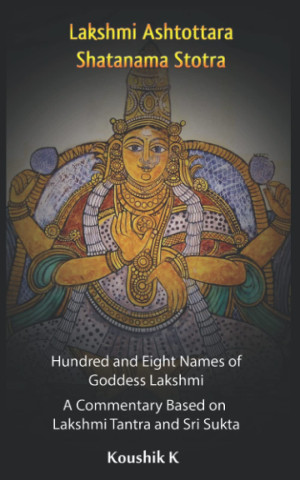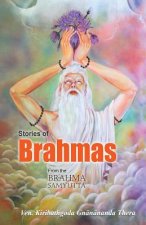
Kod: 36703827
Lakshmi Ashtottara Shatanama Stotra - Hundred and Eight Names of Lakshmi
Autor K Koushik K
Lakshmi Ashtottara Shatanama Stotra the hymn of hundred and eight names of Lakshmi is an important hymn of lakshmi which was taught to goddess Parvati by Lord Shiva. This hymn is called daridrya mochana - that which liberates thos ... więcej
- Język:
 Angielski
Angielski - Oprawa: Miękka
- Liczba stron: 224
Wydawca: Independently Published, 2021
- Więcej informacji o książce

Zobacz książki o podobnej tematyce
-

The Dangerous Convenience Store Vol. 2
97.20 zł -1 % -

7th Time Loop: The Villainess Enjoys a Carefree Life Married to Her Worst Enemy! (Manga) Vol. 1
56 zł -14 % -

Varna Shiksha: The Qualities, Colors, Genders and Devatas of the Letters of the Sanskrit Alphabet
45.16 zł -

Cambridge IGCSE™ English as a Second Language Practice Tests with Answers with Digital Access (2 Years)
134.78 zł -30 % -

The Art of Sexting & Erotic Texting
56.45 zł -

Ganesha Pancharatnam: A hymn on Ganesha by Shankara Bhagavadpada
43.05 zł -

Shadpadee Stotra: A Hymn on Vishnu by Adi Shankaracharya
43.05 zł -

Curvy Girl Sex
84.11 zł -23 % -

Ardhanarishvara Stotra: A Hymn on Unified Form of Shiva and Shakti by Shankara Bhagavadpaada
43.05 zł -

Ekataa: Oneness among Shiva, Shakti and Vishnu
66.78 zł -

Shiva Shadakshara Stotra: A hymn on Shiva's Six Syllable Mantra
43.05 zł -

Kalabhairavashtakam: Eight Verses on Kalabhairava by Shankara Bhagavadpaada
43.05 zł -

Hanuman Chalisa Explained
52.14 zł -

Shiva Panchakshara Strotra
43.05 zł -

Hundred and Eight Names of Bhairava
54.09 zł -

Stories of Brahmas from the Brahma Samyutta
33.10 zł -

Sarasvati Ashtottara Shatanama Stotra: Hundred and Eight Names of Sarasvati
43.11 zł -

Fat Sex Volume 1
88.44 zł -

Big Book of Kamasutra Sex Positions
68.19 zł -

My Wife's a Bitch
50.99 zł -

Ancient Kemite Islam and the Preservation of Ma'at: The missing link between Kemetic and Moorish civilization
64.20 zł
Bon podarunkowy: Radość gwarantowana
- Podaruj bon o dowolnej wartości, a my się zajmiemy resztą.
- Bon podarunkowy dotyczy całej naszej oferty.
- Możesz wydrukować elektroniczny bon z e-maila a następnie przekazać go obdarowanemu.
- Ważność bonu wynosi 12 miesięcy od daty wystawienia.
Więcej informacji o Lakshmi Ashtottara Shatanama Stotra - Hundred and Eight Names of Lakshmi
Za ten zakup dostaniesz 36 punkty
 Opis
Opis
Lakshmi Ashtottara Shatanama Stotra the hymn of hundred and eight names of Lakshmi is an important hymn of lakshmi which was taught to goddess Parvati by Lord Shiva. This hymn is called daridrya mochana - that which liberates those who recite from all kinds of poverty.
the hymn has been explained mainly with the help of Lakshmi tantra and sri sukta bhashya, Health, wealth, prosperity wisdom and all other kinds of wealth are granted by the goddess for those who worship her with devotion through this hymn. The glories and qualities of goddess Lakshmi are well described through all the hundred and eight names and those are explained in detail in this book with the help of Lakshmi Tantra a pancharatra text , puranas and various sacred scriptures.
The specialty of Lakshmi tantra is that it is a conversation between goddess Lakshmi and Lord Indra the king of the gods. Goddess Lakshmi herself teaches Indra her glories and method of worship. Most of the Shlokas quoted in this book to explain the names of goddess Lakshmi is quoted from Lakshmi tantra, the goddess herself explains the meaning of her names in first person narrative. (and I have translated those verse in the same style example: Hence I am praised as… etc.)
Some names have been explained by quoting other sources where the first-person narrative is not used. The reason for using that style of narrative is to put an emphasis that its goddess herself explaining her epithets and glories.
 Szczegóły książki
Szczegóły książki
60.95 zł
- Pełny tytuł: Lakshmi Ashtottara Shatanama Stotra - Hundred and Eight Names of Lakshmi
- Podtytuł: A Commentary Based on Lakshmi Tantra and Sri Sukta
- Autor: K Koushik K
- Język:
 Angielski
Angielski - Oprawa: Miękka
- Liczba stron: 224
- EAN: 9798528334905
- ISBN: 852833490Y
- ID: 36703827
- Wydawca: Independently Published
- Waga: 227 g
- Wymiary: 203 × 127 × 12 mm
- Data wydania: 03. July 2021
Ulubione w innej kategorii
-

Dune
34.84 zł -33 % -

Haunting Adeline
125.81 zł -1 % -

Berserk Deluxe Volume 2
212.65 zł -1 % -

White Nights
15.30 zł -23 % -

Powerless
48.75 zł -11 % -

Atomic Habits
59.22 zł -26 % -

Dune Messiah
46.33 zł -3 % -

Berserk Deluxe Volume 3
218.19 zł -3 % -

One Day
32.63 zł -36 % -

Berserk Deluxe Volume 1
211.84 zł -2 % -

Iron Flame
61.14 zł -28 % -

Surrounded by Idiots
36.76 zł -28 % -

Harry Potter and the Prisoner of Azkaban (Minalima Edition)
170.44 zł -2 % -

Gravity Falls Journal 3
89.45 zł -

Heaven Official's Blessing: Tian Guan Ci Fu (Novel) Vol. 1
88.94 zł -1 % -

The Creative Act
100.22 zł -15 % -

Dune
47.34 zł -23 % -

Hunting Adeline
126.52 zł -4 % -

A Little Life
47.04 zł -14 % -

Children of Dune
46.73 zł -2 % -

Heaven Official's Blessing: Tian Guan Ci Fu (Novel) Vol. 2
77.76 zł -14 % -

Bungo Stray Dogs, Vol. 8 (light novel)
65.77 zł -4 % -

Percy Jackson and the Olympians 5 Book Paperback Boxed Set
185.55 zł -4 % -

Solo Leveling, Vol. 1
86.73 zł -3 % -

The Prisoner's Throne
44.92 zł -12 % -

Court of Thorns and Roses
43.41 zł -15 % -

Cry Baby Coloring Book
47.34 zł -1 % -

Fourth Wing
73.93 zł -12 % -

Icebreaker
35.15 zł -26 % -

Berserk Deluxe Volume 6
218.19 zł -3 % -

Avatar, the Last Airbender: The Kyoshi Novels (Box Set)
169.23 zł -2 % -

The 48 Laws of Power
100.93 zł -12 % -

House of Leaves
124.10 zł -3 % -

Twisted Lies
37.77 zł -26 % -

Dune Messiah
49.65 zł -13 % -

No Longer Human
58.52 zł -5 % -

48 Laws Of Power
61.14 zł -28 % -

Twisted Games
37.77 zł -26 % -

Caraval Paperback Boxed Set
175.58 zł -3 % -

Solo Leveling, Vol. 2
80.38 zł -17 % -

Open Circuits
169.63 zł -2 % -

Berserk Deluxe Volume 5
156.54 zł -30 % -

Heaven Official's Blessing: Tian Guan Ci Fu (Novel) Vol. 3
77.26 zł -14 % -

Berserk Deluxe Volume 4
201.36 zł -11 % -

Court of Mist and Fury
36.56 zł -26 % -

SOLO LEVELING V08
88.44 zł -2 % -

English File Upper Intermediate Multipack A (4th)
100.63 zł -

CHAINSAW MAN V14
42.70 zł -23 % -

Before the Coffee Gets Cold
33.94 zł -26 %
zadowolonych klientów
Od roku 2008 obsłużyliśmy wielu miłośników książek, ale dla nas każdy był tym wyjątkowym.
Copyright! ©2008-24 libristo.pl Wszelkie prawa zastrzeżonePrywatnieCookies



 21 milionów książek
21 milionów książek Dostawa 10.99 zł
Dostawa 10.99 zł (32) 444 93 66 (8-15.30h)
(32) 444 93 66 (8-15.30h)